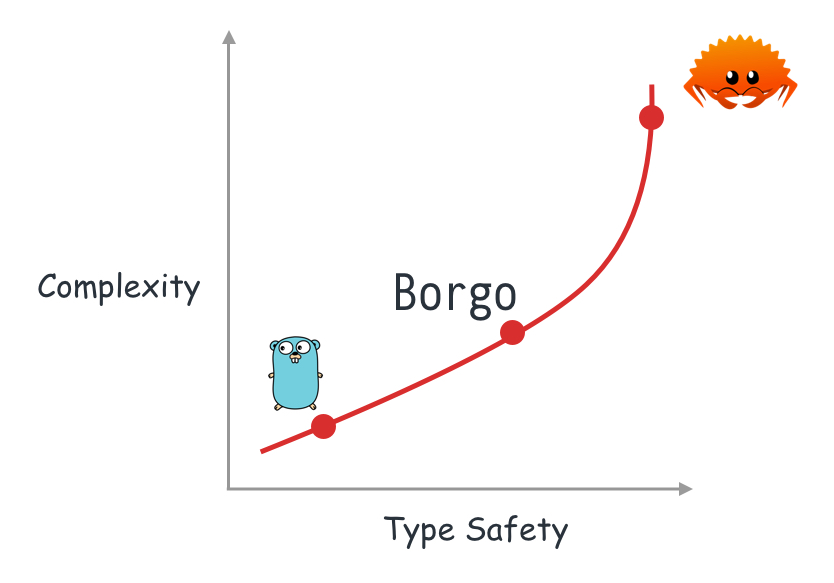I want a language for writing applications that is more expressive than Go but less complex than Rust.
Go is simple and straightforward, but I often wish it offered more type safety. Rust is very nice to work with (at least for single threaded code) but it's too broad and complex, sometimes painfully so.
Borgo is a new language that transpiles to Go. It's fully compatible with existing Go packages.
Borgo syntax is similar to Rust, with optional semi-colons.
Check out the online playground for a tour of the language.
You can also take a look at test files for working Borgo code:
use fmt
enum NetworkState {
Loading,
Failed(int),
Success(string),
}
let msg = match state {
NetworkState.Loading => "still loading",
NetworkState.Failed(code) => fmt.Sprintf("Got error code: %d", code),
NetworkState.Success(res) => res,
}// import packages from Go stdlib
use fmt
use os
let key = os.LookupEnv("HOME")
match key {
Some(s) => fmt.Println("home dir:", s),
None => fmt.Println("Not found in env"),
}use fmt
use net.http
fn makeRequest() -> Result<int, error> {
let request = http.Get("http://example.com")
match request {
Ok(resp) => Ok(resp.StatusCode),
Err(err) => Err(fmt.Errorf("failed http request %w", err))
}
}use fmt
use io
use os
fn copyFile(src: string, dst: string) -> Result<(), error> {
let stat = os.Stat(src)?
if !stat.Mode().IsRegular() {
return Err(fmt.Errorf("%s is not a regular file", src))
}
let source = os.Open(src)?
defer source.Close()
let destination = os.Create(dst)?
defer destination.Close()
// ignore number of bytes copied
let _ = io.Copy(destination, source)?
Ok(())
}Small game from the Rust book, implemented in Borgo.
Things to note:
- import packages from Go stdlib
strconv.Atoireturns anOption<int>Reader.ReadStringreturns aResult<string, error>(which can be unwrapped)
use bufio
use fmt
use math.rand
use os
use strconv
use strings
use time
fn main() {
let reader = bufio.NewReader(os.Stdin)
let secret = rand.Intn(100) + 1
loop {
fmt.Println("Please input your guess.")
let text = reader.ReadString('\n').Unwrap()
let text = strings.TrimSpace(text)
let guess = match strconv.Atoi(text) {
Ok(n) => n,
Err(_) => continue,
}
fmt.Println("You guessed: ", guess)
if guess < secret {
fmt.Println("Too small!")
} else if guess > secret {
fmt.Println("Too big!")
} else {
fmt.Println("Correct!")
break
}
}
}Borgo is written in Rust, so you'll need cargo.
To compile all .brg files in the current folder:
$ cargo run -- buildThe compiler will generate .go files, which you can run as normal:
# generate a go.mod file if needed
# $ go mod init foo
$ go run .

